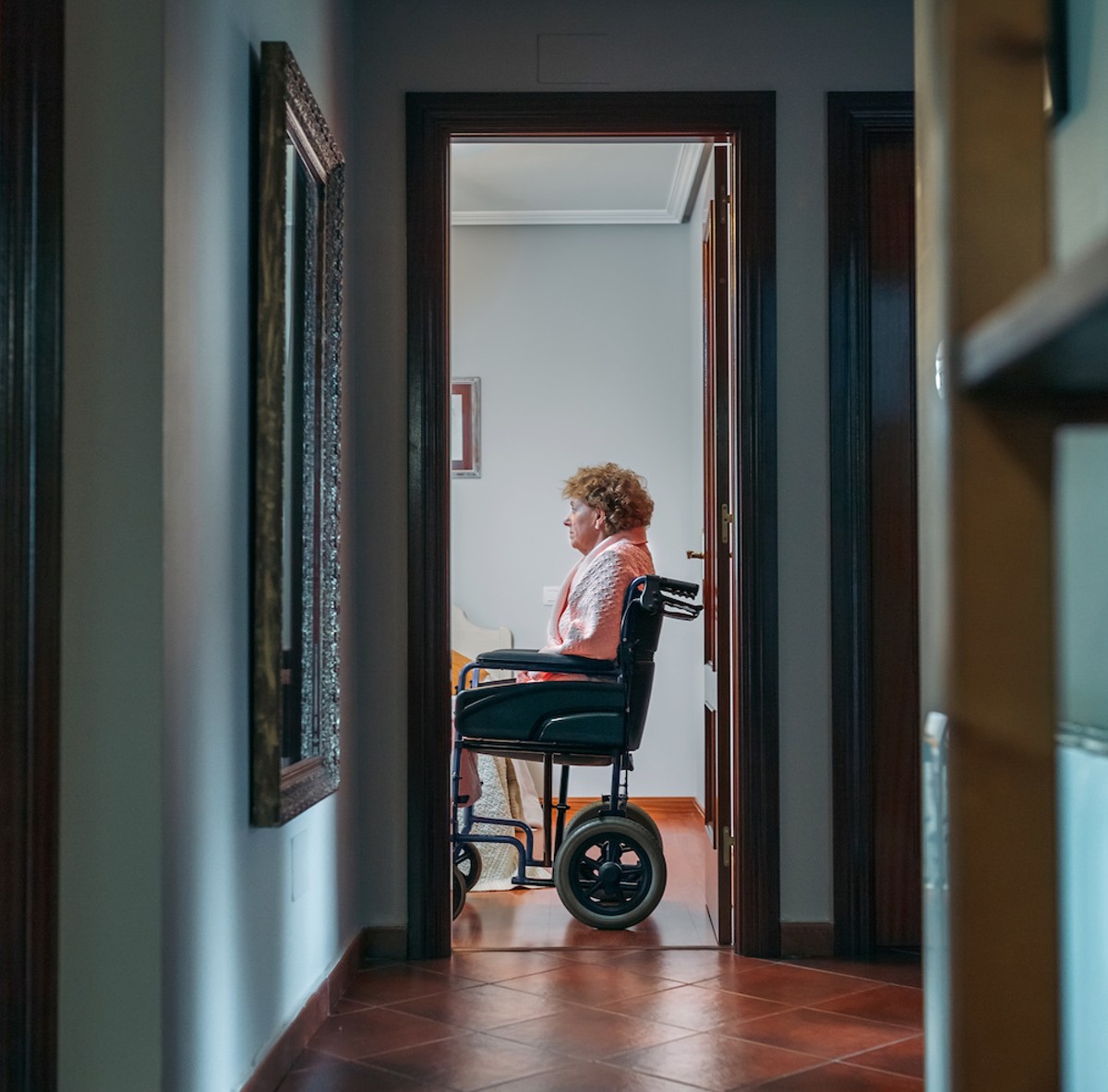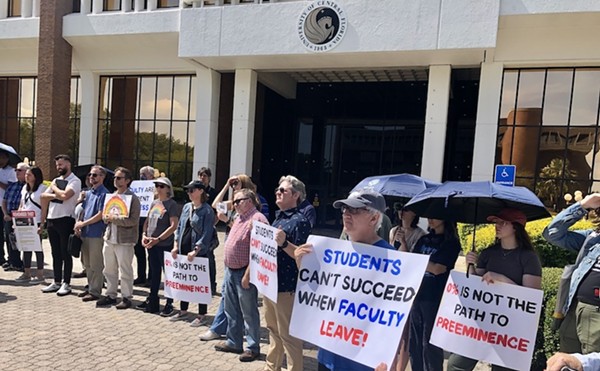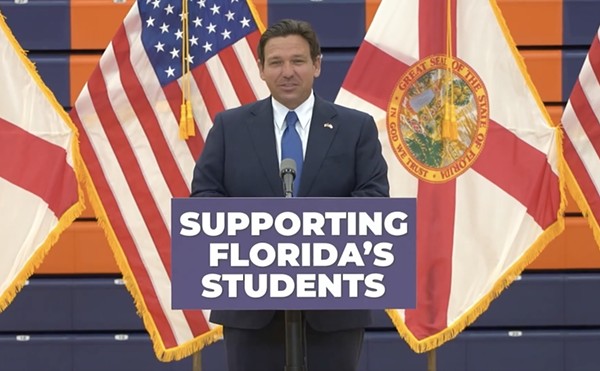At 3 and 6 a.m., Sandra Veerapen, who looks after her bedridden mother, is up to handle each hour's responsibility. At 3, it's time to change mom, who is 74 and suffers from Alzheimer's disease. At 6, it's time for medication and another change. With her mom settled for a bit, Veerapen shifts over to the care of her 34-year-old brother, who is autistic and blind. She feeds and shaves him and, if baby bro could use a hair cut, gives him a trim.
Aside from maintaining a clean look, Veerapen's brother can also carry a tune. In his downtime, after his sister has tended to his needs, he plays his keyboard or lies in bed singing Motown songs. When he wants juice, he'll signal to Veerapen by singing "Old MacDonald Had a Farm."
Veerapen's mother is not entirely cognitively "there" due to her Alzheimer's, and, bedridden, spends her free time watching shows like The View and movies, particularly the Madea flicks by Tyler Perry. "Today, she was watching Bad Boys," says Veerapen. "I heard her in there chuckling."
Veerapen doesn't really have what you'd call a lot of free time.
The 55-year-old came to Apopka in 2018 to look after her family. If it weren't for Veerapen's full-time care, both her mother and brother would need to live in a nursing home or assisted living facility, the high costs of which would be left to the Florida taxpayers. For taking on the burden, the state pays Veerapen some of the money that it would otherwise have to fork over for professional care.
That pay is not enough for Veerapen to qualify for the Affordable Care Act's subsidies. Yet she makes too much to qualify for Medicaid in Florida. This insurance gap is one found in states, like Florida, ruled by lawmakers who choose to opt out of expanding Medicaid to low-income residents. Just to be clear, the federal government pays 90 percent of the cost of covering those who would be brought into insurance by the expansion – states are only responsible for the remaining 10 percent.
Before 2015, when she came to Florida, Veerapen lived in New York, where she worked for financial institutions like Chase and Capital One reconciling accounting systems with customer transactions. It's also where she was diagnosed with sarcoidosis, an autoimmune disease that forms cysts on the lungs and other organs. But in New York, one of 23 states to opt in to the expansion, Veerapen was covered by Medicaid, which enabled her to see specialists like a pulmonologist, and also seek treatment for her high blood pressure and detached retinas.
Nearly 2,800 people in Florida have died prematurely because of the state’s decision not to expand care.
tweet this
Now, in Florida, Veerapen pursues medical care for her ailments without any insurance. (Her brother's blindness qualifies him for Medicaid, and her mother qualifies for Medicare as a citizen over 65 years old.) She periodically goes to a clinic in Apopka that charges for care on a sliding scale. But getting out of the house means she has to pay a healthcare practitioner $15 an hour to watch her family. There's hardly any money left over after taking care of her brother and sister and maintaining the house to pay for a certified sitter, let alone pay to see an ophthalmologist or a cardiologist even once.
As such, Veerapen simply hasn't seen the doctor much. She is one of thousands of Floridians caught in the gap.
According to a study by Leavitt Partners, a health care intelligence business with offices in Washington, D.C., if Medicaid were expanded in Florida, an estimated 837,514 people would become eligible and enrolled over the next five years. The report also notes that the expansion would bring in $14.3 billion in federal cash, netting Florida savings north of $380 million.
In the time since the Supreme Court ruled in 2012 that states were not required to opt in to Medicaid expansion for lower-income people, nearly 2,800 people in Florida have died prematurely because of the state's decision not to expand care, according to report by the D.C.-based research and policy institute Center on Budget and Policy Priorities.
But there's no chance a bill to expand Medicaid will make it through the Republican-held Florida Legislature this session. In 2014, then-Senate President Don Gaetz, R-Niceville (father of never-expander and present Florida Rep. Matt Gaetz, R-Fratboy Nation), in an attempt to bring in the billions of federal money left on the table with each passing opt-out, tried to convince his party to come up with a compromise system that expanded Medicaid. But House Speaker Will Weatherford, R-Wesley Chapel, killed any such notion.
Before that session, then-Gov. Rick Scott experienced a human nanosecond after his mother died, in which he said no one should be without health care and expressed light interest in expanding Medicaid. But he quickly returned to a hard-line stance against opting in. In the summer of 2015, following a debate between nearly 60 lawmakers that lasted over six hours, there was a Medicaid expansion vote in the Florida House. But the measure was resoundingly voted down 72-41.
"I believe it's one of the worst [decisions] made in my 10 years," said Sen. Lori Berman, D-Boynton Beach, who was then in the Florida House. Berman, who is the co-sponsor of a current bill in the Senate to expand Medicaid, said that the decision is "life or death" for thousands, at great expense to the state. "And we're talking about people getting the preventive care they need, which would save the state money in the long run."
Berman noted that the bill, also sponsored by Sen. Gary M. Farmer, Jr., D-Broward County, and authored by Sen. Annette Taddeo, D-Miami, will not pass. There was an effort to make the Medicaid question a measure on the 2020 ballot, but after the Legislature blocked further fundraising to place the measure on the ballot, the group, Florida Decides Healthcare Inc., didn't get enough signatures to place the question as part of the 2020 vote.
"I think it's outrageous the Legislature doesn't have the courage to do it," says Taddeo, "and, if they don't, then leave it up to the voters, let them decide." This is the third time Taddeo has filed a Medicaid expansion bill.
In the Senate and especially in the House, Florida's Legislature continues to be incredibly hostile toward expanding healthcare to lower-income folk. Orlando Weekly reached out to more than 20 Central Florida Republican lawmakers. Only one responded: Howey-in-the-Hills Rep. Anthony Sabatini. Here's what he had to say:
"Medicaid is a broken system and expanding it would be detrimental to Florida and the budget," Sabatini said via email. "We should be focusing on lowering the cost of healthcare by increasing competition in the healthcare marketplace."
Maybe we should sing him a few rounds of "Old MacDonald Had a Farm."
– This story appears in the March 4, 2020, print issue of Orlando Weekly. Stay on top of Central Florida news and views with our weekly newsletters.


















